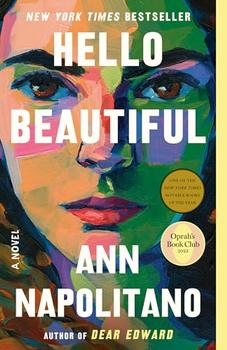Summary | Excerpt | Reading Guide | Reviews | Beyond the Book | Readalikes | Genres & Themes | Author Bio

A Novel
by Ann Napolitano
In fifth grade, the gym teacher at his elementary school said, "I see you out there shooting baskets in the afternoons. How tall is your father?"
William stared at the man blankly. "I'm not sure. Normal height?"
"Okay, so you'll probably be a point guard. You need to work on your handle. You know Bill Bradley? That gawky guy on the Knicks? When he was a kid, he taped cardboard to his glasses so he couldn't look down, couldn't see his feet. And then he dribbled up and down the sidewalk wearing those glasses. He looked crazy, no doubt, but his handle got real tight. He has a perfect feel for how the ball will bounce and how to find it without looking."
William sprinted home that afternoon, his entire body buzzing. This was the first time a grown-up had looked directly at him—noticed him, and noticed what he was doing—and the attention threw him into distress. William had a sneezing fit while he was digging for a pair of toy glasses in the back of his desk drawer. He visited the bathroom twice before he carefully taped rectangular pieces of cardboard to the bottom of the glasses.
Whenever William felt sick or odd, he worried he was going to die. At least once a month he would crawl under his covers after school, convinced he was terminally ill. He wouldn't tell his parents, because illness wasn't permitted in his house. Coughing, in particular, was treated as a horrific betrayal. When William had a cold, he allowed himself to cough only in his closet with the door closed, his face muffled by the row of hanging button-down shirts he had to wear for school. He was aware of that familiar worry tickling his shoulders and the back of his head while he ran outside with the ball and glasses. But William had no time for illness now, no time for fear. This felt like the final click of his identity falling into place. The boys on the court had recognized him, and the gym teacher had too. William might have had no idea who he was, but the world had told him: He was a basketball player.
The gym teacher gave him additional tips that allowed William to develop more skills. "For defense: Push kids away with your shoulder and your butt. The refs won't call those as fouls. Do sprints: Get a quick first step and beat your man off the dribble." William worked on his passing too, so he could feed the ball to the best players in the park. He wanted to keep his place on the court, and he knew that if he made the other boys better, he had value. He learned where to run to provide space for the shooters to cut in to. He set screens so they could take their favorite shots. The boys slapped William on the back after a successful play, and they always wanted him on their side. This acceptance calmed some of the fear William carried inside him; on the basketball court, he knew what to do.
By the time William entered high school, he was a good-enough player to start for the varsity team. He was five foot eight and played point guard. His hours of practice with the glasses had paid off; he was by far the best dribbler on the team, and he had a nice midrange jumper. He'd worked on his rebounding, which helped offset his team's turnovers. Passing was still William's best skill, and his teammates appreciated that they had better games when he was in the lineup. He was the only freshman on the varsity team, and so when his older teammates drank beer in the basement of whoever's parents were willing to look the other way, William was never invited. His teammates were shocked—everyone was shocked—when, in the summer after his sophomore year, William grew five inches. Once he started growing, his body seemed unable to stop, and by the end of high school he was six foot seven. He couldn't eat enough to keep up with his growth and became shockingly thin. His mother looked frightened when he lurched into the kitchen every morning, and she'd hand him a snack whenever he passed nearby. She seemed to think his skinniness reflected badly on her, because feeding him was her job. His parents sometimes came to his basketball games, but at odd intervals, and they sat politely in the stands, appearing not to know anyone on the court.
From Hello Beautiful by Ann Napolitano. Copyright © 2023 by Ann Napolitano. Published by The Dial Press, an imprint of Random House, a division of Penguin Random House LLC. All rights reserved.
Your guide toexceptional books
BookBrowse seeks out and recommends the best in contemporary fiction and nonfiction—books that not only engage and entertain but also deepen our understanding of ourselves and the world around us.